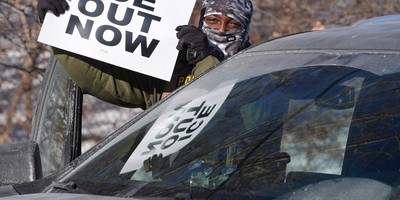After the mass shooting that killed eight people at a shopping mall in Allen, Texas, last Saturday, President Joe Biden said that horrifying crime reinforced the case for "enacting universal background checks." Yet the perpetrator, who was killed by a police officer at the scene, had been licensed as an armed security guard, which means he passed a background check and was legally allowed to own firearms.
In that respect, the killer was typical of people who commit crimes like this. That is the main reason why expanded background checks cannot reasonably be expected to have much of an impact on mass shootings, contrary to the impression left by politicians who reflexively recommend that solution.
Federal law disqualifies broad categories of Americans from owning firearms, including people who have been convicted of felonies or subjected to court-ordered psychiatric treatment. Background checks are required for all gun sales by federally licensed dealers, and some states extend that requirement to transfers by private sellers.
As several news outlets noted after the Allen attack, Texas is not one of those states. But that detail does not seem relevant in this case: Although the killer bought some guns from private sellers, CNN reported, the rifle he used in the attack was "purchased legally," meaning he was not a "prohibited person" under federal law.
From 2016 to 2020, according to the Texas Online Private Security database, the killer was licensed as an armed guard, a job that is subject to stricter eligibility criteria than the average gun buyer. According to CBS News, "he did not have a serious criminal record."
Nor does it seem that he had the sort of psychiatric record that would have disqualified him from buying a gun. The Washington Post reported that he "joined the Army in June 2008 but was 'terminated' three months later" because of "an unspecified mental health issue" after "failing to complete his initial training."
Recommended
Such separations, the Post explained, "are meant to quickly force out recruits who can't perform military duties as a result of various physical and behavioral conditions. They are not typically punishments and would not show up on background checks."
Like the Allen killer, most mass shooters do not have records that would be flagged by a background check. In mass shootings from 1982 through April 2023 where the source of weapons was known, Statista reports, 85% of the murderers obtained firearms legally.
According to a National Institute of Justice report on public mass shootings from 1966 through 2019, 77% of the perpetrators "purchased at least some of their guns legally," while 13% made "illegal purchases." In mass shootings at K-12 schools, more than 80% of the killers "stole guns from family members."
Even theoretically, then, expanded background checks could make a difference in only a small share of mass shootings. The experience with state laws requiring background checks for all gun sales provides further reason to temper expectations of what that policy can accomplish.
A 2018 study found that such laws, which require that transactions be completed via licensed dealers, were associated with increased background checks in Delaware but not in Colorado or Washington. That suggests these laws are widely flouted by gun owners who resent the additional expense and inconvenience that compliance entails.
Unlike mass shooters, ordinary criminals often have disqualifying records. But they generally obtain firearms from informal sources that would not be affected by new background-check laws.
Studies that aimed to measure the impact of expanded background checks on homicides have produced mixed results. The RAND Corporation deems the evidence concerning mass shootings "inconclusive."
That's not surprising, since notionally "universal" background checks cannot be effective unless private sellers comply. Enforcement is inherently difficult when the government tries to regulate transactions that, by definition, are unrecorded and inconspicuous.
The policy that Biden recommends is undeniably popular. But there is little reason to think it would work as advertised.

























Join the conversation as a VIP Member